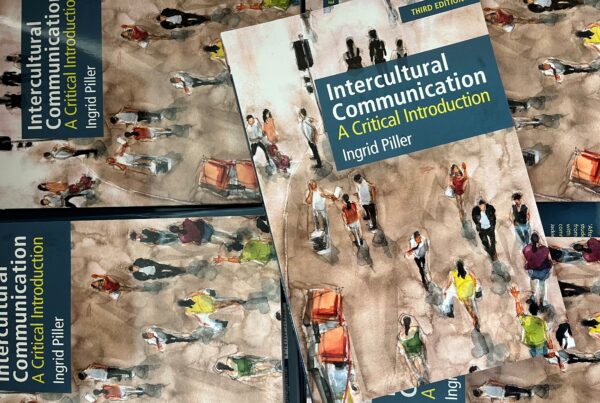 Many people would agree that English is the language of globalization. English is almost always adopted as the official language of international events, including the Olympic Games. It does not mean, however, that the presumed global status of English is wholeheartedly accepted as I learned from over one thousand comments on a recent newspaper article about the Sochi 2014 Winter Olympics. Let me summarise the article first.
Many people would agree that English is the language of globalization. English is almost always adopted as the official language of international events, including the Olympic Games. It does not mean, however, that the presumed global status of English is wholeheartedly accepted as I learned from over one thousand comments on a recent newspaper article about the Sochi 2014 Winter Olympics. Let me summarise the article first.
Written by Masaaki Sasaki of Sankei Shinbun, the article in question has the catchy title of “「Water」が通じない!? 東京五輪にも教訓 (They don’t understand “Water”!? A lesson for the Tokyo Olympic Games”. It reports on the Sochi 2014 Winter Olympic Games under the slogan of “英語の通じない五輪 (Olympic Games Without English)”. Sasaki points out that due to the Soviet-style education system and to the delay in the internationalisation of Sochi as a whole, locals such as police and taxi drivers speak “only” Russian. The writer subsequently warns that Sochi’s language challenge is a good lesson for the organizers of the 2020 Tokyo Summer Olympic Games.
In the article, which has been featured in the special section on the Sochi 2014 Olympic Winter Games on Yahoo Japan (www.sochi.yahoo.co.jp), an Austrian visitor was reportedly appalled at the inability of personnel to speak English at security checkpoints at train stations. A Japanese woman was apparently surprised that a local shop keeper couldn’t even understand “water”. And an American visitor, who is said to have been to 16 Summer and Winter Olympic Games, is quoted as saying “This is the first Olympic Games I visited where we can’t use English”.
Sasaki explains that this is the first time Sochi, a resort area frequented only by Russians, has been visited by a large number of international visitors. A survey conducted by a local agency last year found that 80% of residents didn’t possess basic knowledge of English.
The writer goes on to point out the growing concern among the International Olympic Committee regarding this language issue as the next few Games (2016 Summer Games in Rio de Janeiro, 2018 Winter Games in Korea and 2020 Summer Games in Tokyo) will be held in ‘non-English speaking’ countries. The article ends by suggesting the importance of a technology-based solution for Tokyo, such as smart phone applications allowing communication with foreign visitors.

Prime Minister Shinzo Abe’s English bidding speech in Buenos Aires in September 2013. Credit: Reuters
Indeed, English language proficiency has been central to the discourse of the Tokyo 2020 Olympic Games from the beginning. Prime Minister Shinzo Abe gained a great deal of public admiration when he gave a speech in English at the bidding meeting in Buenos Aires in September 2013. His “impressive” speech in English, which is considered as one of the key winning factors, is even used as learning material how to give presentations in English.
Having secured the right to host the 2020 Olympic Games, Japanese people from all walks of life have increasingly expressed their concern about Japanese people’s presumed ‘poor’ English. The former Tokyo Governor was so worried that last year he proposed to send 200 Japanese secondary school teachers of English overseas for a three-month training period every year. There is no doubt that English fever will further intensify in the years to come, as was the case for the 2008 Beijing Summer Olympic Games (Zhang, 2011).
It is against this context of the taken-for-granted belief that English is neceessary to host successful Olympic Games that many of the comments on the article about the Sochi 2014 Winter Games need to be understood. These comments reveal a wide range of deep-seated disagreement with, if not contempt of and disgust for, the English-centric mindset.
Published on 19 February 2014, the article attracted 1,170 comments on Yahoo Japan site by 25 February. Yahoo Japan allows you to see comments in five different ways; (1) timing of posts (latest to earliest), (2) agreement [no. of thumbs up), (3) disagreement [no. of thumbs down], (4) trending [no. of thumbs up + no. of thumbs down), and (5) sympathized (most to least) [no. of thumbs up minus no. of thumbs down]. I’ll introduce the top five most-agreed comments here.
The most agreed (and simultaneously most disagreed, trending and sympathized) comment of all was made by fre***** (handle name) as follows:
“裏を返せば、英語しか話せない連中の自己中 [The flip side of this is egocentrism among English monolingual speakers; my translation]”
fre*****’s comment has received 10,039 thumbs up and 1,760 thumbs down, attracting a whopping 172 replies. The replies are a site of intense debate, mixed between approval and disapproval.
The other four most-agreed comments are:
Number 2: “こんなのはさ、受け入れる側の国も最低限の英語を学ぶようにするのと同時に、行く人間も現地での挨拶くらい覚えてから行けよ。相互理解とか国際協調とかいうならそれが第一歩。[The issue like this, people in a host country should learn basic English, but at the same time visitors should learn local greetings before they go. That’s the first step towards mutual understanding and international corporation. My translation. 8,717 thumbs up; 454 thumbs down; 15 replies]
Number 3: さすがにWater位は日本人も分かるとは思うけど、案外同様のことが起こるかもね。戦後の日本で簡単な英会話本が結構売れたこともあったし、これからは自発的に簡単な会話が学べ、活用できる環境になれば良いと思う。 [Japanese would at least understand water, but something similar might happen. A lot of English conversation books have been sold after the war, and I hope an environment where we can learn basic conversation proactively and make use of it will be created. My translation. 3,415 thumbs up; 249 thumbs down; 31 replies]
Number 4: 「水」ぐらいは、ロシア語を覚えて行ってもいいんじゃないの?そんな、ソチの地元民からすれば、別に英語を話さなきゃいけない義務なんか無いだろ。[Shouldn’t they have learnt at least “Water” in Russian? It is not a duty of Sochi residents to speak English. My translation. 2,740 thumbs up; 124 thumbs down; 13 replies]
Number 5: 世界中どこでも英語が通じると思ってる方がバカでしょ![Those who think English is used everywhere in the world are stupid! My translation. 2,865 thumbs up; 273 thumbs down; 24 replies]
Here, I’m not trying to demonstrate whether more or less people endorse or reject English as an Olympic language. Rather, I find an internet site such as Yahoo Japan an intriguing space to learn about wide ranging counter-discourses, including disgust for the hegemony of English as a global language and its resulting English-centric arrogance that often unfolds at international events such as the Olympic Games. These are the comments we have little chance of hearing face-to-face. Four out of the top five comments are critical of the hegemonic discourse of English as an international language and it is criticisms such as these that often remain unexpressed in other media, particularly in a country where English has long been equated to intelligence and hence academic, professional and personal success.
Furthermore, Number 2 and 4 most-agreed comments condemn the imposition on non-English speaking residents of an Olympic host city to accommodate visitors in English; at the same time, they are an expression of a multilingual mindset. Indeed, many other comments outside the top five suggest that the real issue is the fact that complaining visitors didn’t bother to learn basic Russian before they arrived, as in this comment: “ロシアは英語圏じゃないから、通じないのは当たり前じゃん。逆になんて英語しかしゃべれないやつに合わせなあかんの?他国に行く事前に、相手国の最低限日常用語くらい勉強してから行け!英語イコール国際的じゃねーよ。勘違いすんな!![Of course they don’t use English because Russia is not an English speaking country. Why do they have to accommodate English monolingual speakers? Learn basic everyday vocabularies of the country before you visit! English doesn’t equal being international. Don’t fool yourself!!]” These pro-multilingual comments constitute a sharp contrast to the discourse of monolingual or English-crazed Japan.
Overall, interactive sites such as these demonstrate that the role of English as a global language may be much more contested than it seems on the basis of mainstream media discourses.
![]() Zhang, J (2011). Language Policy and Planning for the 2008 Beijing Olympics: An Investigation of the Discursive Construction of an Olympic City and a Global Population PhD thesis, Macquarie University, Sydney.
Zhang, J (2011). Language Policy and Planning for the 2008 Beijing Olympics: An Investigation of the Discursive Construction of an Olympic City and a Global Population PhD thesis, Macquarie University, Sydney.







 This work is licensed under a
This work is licensed under a
I have to agree with you there. If you are going or visiting a country that does not speak English at least try to study or learn basic words and phrases. Do not expect the country to bend over backwards for you. It only makes you sound selfish for forcing them to speak English. Every time I visit a different country, I try to learn basic phrases since not only would they be impressed, it will also leave an impression that you are indeed interested in their culture.
So maybe English people with poor ability to learn languages should stay away from the Olympics. That’s cool. And maybe the Spanish and Arabic speakers who have used their language ability to learn the language most valuable to them should also stay home. Also cool. But then you start to run out of people willing to attend the games.
Esperanto tried to use too many languages. If you want an artificial global language take English (because of global reach and importance) Spanish (has a wide range that is more localized than English but larger population) and maybe Mandarin (due to the large number of speakers but lesser range) and merge them. Choose extremely common words from each language and include them in the new language so that each group of speakers can pick up the new one faster–recognizing half to one third of the words to begin with. This would make the languages merge quickly and create a critical mass needed to make the new language valuable for other language speakers to learn. Publishers, broadcasters and content creators would have a massive audience, encouraging them to use the new standardized “Spanglish” or “Spanglese”.
Or just accept that the need for an international language is so great and English has found itself in the right place at the right time to fit the role. An English speaker doesn’t gain as much from learning any language as those speakers gain from learning English. Not arrogance, realism.
The writer did not do a research on the use of English. BBC in 2010 reported that 75% of the people in the world do not speak a word of English. How could the writer claimed that many people. Besides, The Telegraph in 2008 also reported that by the turn of 2020, native English speakers would be only 300 millions.
Esperanto is recommended by UNESCO since 1954 as the international language. The 1985 resolutions urged all the international NGOs to use Esperanto. The 1980 Manila Manifesto also urged the tourism industry to use Esperanto. But a handful of the org are using Esperanto.
If anyone wants to dispute the use of Esperanto, get the UNESCO to cancel the resolutions.
It is the word RESPECT that human beings are not into it.
Paying interpreters in the UN is from your pocket. Is that difficult for most people to command two languages, the native language and Esperanto. If unfortunately one, like me, have to learn 3 languages instead of two, the mother tongue, the national language and Esperanto.
Read http://www.2-2.se to see how much money can be saved from the UN translation to save the lives in Africa.
Nobody has an obligation to learn or speak English. I’m quite happy with the idea of going to see the OG in a country where nobody speaks English. It would make it more of an adventure, which is what travelling was originally supposed to be about. Nevertheless, since Esperanto didn’t work out, we’re stuck with English as the easiest way to communicate among people who speak different languages. An economic and cultural reality borne from the dominance of the US. Since it’s there, why not grab it? You just learn one language instead of seventeen and you get around.The French don’t like it, they never will. Not because they don’t think there should be a global language, but because they think it should be French. At the end of the day people learn one language over another because they think it will get them a job or a better job. While not excusing the arrogance of those who feel that everyone around them should speak English (suck it up, don’t like it? don’t leave home), the motivating factor for learning English is pure self-interest (not some overwhelming global dictatorial decision or love of the English language). People simply feel that it may improve their life chances, just like anything else they choose to learn in their lives. French-speakers need to get over their resistance to English. French has been had its moment as the ‘common-European language’ in terms of diplomacy and culture and it seems to be suffering a linguistic hang-over. If France had settled the current US everyone would be learning French, and I, for one, would be enjoying the bi-linguality of it all. But they didn’t. It’s not about the aesthetics of a language – I love English and all its intricacies and eccentricities (as most people seem to love their own language) and also love the sound and music of French, though I don’t appreciate its nuances. But it’s not about that. It’s about the random effects of history and the functional, practical way to improve your life chances.
Mutial understanding of a client and a service is part of Olimpic Games support in any country. All the comments reflect the dialectics of it. That is all to say in my vieu.
Quite agree that the real surprise here is not that many of the locals were not able to speak English but that visitors to the games didn’t arm themselves with with a few words of Russian and a phrase book. It’s basic courtesy when you visit a foreign country to at least try to make yourself understood in the host language rather than huffing and puffing about the local’s inability to understand your English.
I certainly agreed with Nicole that English is too hard to learn and it is the hardest language to read.
http://www.newscientist.com/article/dn1233-english-is-toughest-european-language-to-read.html
Learning Esperanto requires about 200 hours or less but learning English needs 3200 hours. Who can afford that much of time to learn that imperialist language. With Esperanto as the base, perhaps, they can speak and understand better Russian.
Cambridge ESOL said that each level is reached with the following guided learning hours:
A2, 180–200;
B1, 350–400;
B2, 500–600;
C1, 700–800, and
C2, 1,000–1,200.
Total:3,200 hours
http://en.wikipedia.org/wiki/Common_European_Framework_of_Reference_for_Languages
I hope the 2018 Winter Olympic in Korea and also 2020 Summer Olympic the Esperantists in both countries can do some counselling to the organisers about Esperanto. Just learn the language a year or half a year before going to the host country and solve most linguistic problem.
Here in Australia the problem arises LONG before multilingualism. I was ashamed to find that our Australian television commentators (with one or two notable exceptions) seemed to make no attempt to respect competitors’ names.
Braaten, for example, became Bretarn (strong stress on the last syllable) Any French name with an “e” at the end was Australianized — except for the “e”, which was pronounced “ay”.
What would English speakers think if “Jones” was pronounced “Jenos” or “Smith” Shmif”?
I have no idea whether commentators speaking other languages did similar things. If they did not, then we would have a sad reflection on the hegemony of English and its effects…
Insightful and well researched essay Kimie. Thanks.
Your statement in conclusion is measured, even wise beyond your years I’d say.
Consider throwing into the mix the increasing strength of Mandarin Chinese as Beijing’s economy expands while Washington’s legions abroad start to come home. Déjà vu?
For the moment let’s put aside the questions of (1) language justice cited in the UN’s Declaration of Human Rights and (2) examples provided by contenders from the past like Latin, Manchu and French while we consider some practical issues vis-a-vis English:
Although English is currently used as the international language of tourism and business and ergo aeronautical and marine navigation and communication too, numerous fatal accidents testify to its dialectal variation and the extreme difficulty to both learn and retain it. For example, we Australians are not renowned for our pronunciation of English, thus creating some minor problems for American and British visitors. Imagine a Pakistani pilot being guided by a Scottish air traffic controller to land his stricken aircraft. Yet, all these nationalities mentioned have used English as an official language for centuries.
By the way, ‘water’ in Chinese simplified, traditional and Japanese is virtually the same – 水 水 水 – provided my old eyes are up to it. Nevertheless, the People’s Republic has some work ahead unifying the scripts used in Hong Kong, Taiwan etc. In the role of an easy universal auxiliary idiom I prefer ‘akvo’.
I would have to agree with Nicole. Why should locals have to learn English? Learn the native language or learn Esperanto. Don’t expect everyone else to change for you.
Very interesting to draw our attention that English is not spoken everywhere. It is indeed very selfish to expect everyone to learn English and visitors don’t even make the effort of learning the most basic words of the country they visit. It shows to me that Esperanto could be a big help. Learning English is just too time-consuming for Japanese people and many others. We need a language where everyone has to make a little effort, which is culturally neutral. It is not fair that native English speakers have such a big advantage. We need a language that can be learnt in a reasonable amount of time, that doesn’t require long stays overseas.